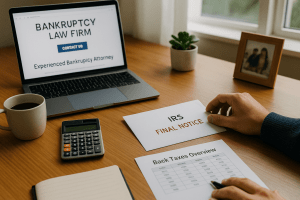
Can You File Bankruptcy on Back Taxes? What the IRS and Bankruptcy Code Allow
Can You File Bankruptcy on Back Taxes? Can you file bankruptcy on back taxes? Yes—but only under specific conditions. While
Error: Contact form not found.
Lorem ipsum dolor sit amet, consectetur adipiscing elit. Ut elit tellus, luctus nec ullamcorper mattis, pulvinar dapibus leo.
Can you file bankruptcy on back taxes? Yes—but only under specific conditions. While not all tax debts are eligible for discharge, certain income taxes may be discharged in Chapter 7 or addressed through repayment in Chapter 13 bankruptcy. To determine if your back taxes qualify, you must meet several legal criteria and timing requirements.
In this blog, we’ll explain how tax debt fits into the bankruptcy process, what types of taxes are eligible, and how to know if you qualify for relief.
Not all taxes can be erased through bankruptcy. But if you file bankruptcy on back taxes that meet certain IRS and court requirements, some or all of your debt may be discharged.
Here are the key factors that determine eligibility:
The tax return must have been due at least three years before you file bankruptcy.
You must have filed the tax return at least two years before filing for bankruptcy, even if you filed late.
The IRS must have assessed the tax at least 240 days before your bankruptcy filing.
The return cannot be fraudulent or associated with willful tax evasion.
If all these requirements are met, you may be able to discharge certain back income taxes through Chapter 7 or restructure repayment in Chapter 13. Payroll taxes, recent tax obligations, and penalties for fraud generally cannot be discharged.
This is the quicker, liquidation-based option. If you qualify, you can file bankruptcy on back taxes, and certain taxes may be discharged if they meet all dischargeability tests. You’ll need to pass the means test and risk losing non-exempt assets.
This option creates a payment plan over 3–5 years. Even if your taxes aren’t dischargeable, Chapter 13 may limit additional interest and penalties during the case and address wage garnishment or tax lien issues.
Filing Chapter 13 may be your best option if:
If you file bankruptcy on back taxes, an automatic stay goes into effect immediately. This generally pauses collection activity by the IRS or state tax agency, including:
The stay provides breathing room while your case is reviewed by the bankruptcy court. If your tax debt qualifies for discharge, the IRS may be restricted from collecting qualifying discharged tax debt after your case is completed.
Tax liens are tricky. Filing bankruptcy may discharge the personal obligation to pay the debt, but if the lien was recorded before your bankruptcy filing, it may still attach to your property.
In these situations, you may need to:
Understanding your full legal picture is key.
If you’re wondering, can you file bankruptcy on back taxes? The answer is often yes, but with limitations. Filing at the right time, using the right chapter, and understanding tax-specific rules can make a huge difference.
A bankruptcy attorney can help:
Still asking, can you file bankruptcy on back taxes and get real relief? Bankruptcy may be an option to consider if you’re overwhelmed by IRS debt.
Connect with a vetted attorney through BankruptcyAttorneys.net and get a free evaluation tailored to your financial situation. Legal support can help you understand how bankruptcy may affect your assets and whether certain tax debts may qualify for discharge.
No. Only certain income taxes can be discharged if they meet specific time and filing rules.
If the taxes are discharged, interest and penalties tied to those debts are also wiped out.
You typically can’t discharge tax debt for unfiled returns. You must have filed at least two years prior to filing for bankruptcy.
Yes. The automatic stay stops wage garnishments immediately once you file.
Yes. Many people use Chapter 13 to manage or repay nondischargeable taxes over time while protecting their assets.
Attorney Advertising. This site is a legal marketing service and does not provide legal advice. Submitting information does not create an attorney-client relationship. Results are not guaranteed.

Can You File Bankruptcy on Back Taxes? Can you file bankruptcy on back taxes? Yes—but only under specific conditions. While
| Cookie | Duration | Description |
|---|---|---|
| cookielawinfo-checkbox-analytics | 11 months | This cookie is set by GDPR Cookie Consent plugin. The cookie is used to store the user consent for the cookies in the category "Analytics". |
| cookielawinfo-checkbox-functional | 11 months | The cookie is set by GDPR cookie consent to record the user consent for the cookies in the category "Functional". |
| cookielawinfo-checkbox-necessary | 11 months | This cookie is set by GDPR Cookie Consent plugin. The cookies is used to store the user consent for the cookies in the category "Necessary". |
| cookielawinfo-checkbox-others | 11 months | This cookie is set by GDPR Cookie Consent plugin. The cookie is used to store the user consent for the cookies in the category "Other. |
| cookielawinfo-checkbox-performance | 11 months | This cookie is set by GDPR Cookie Consent plugin. The cookie is used to store the user consent for the cookies in the category "Performance". |
| viewed_cookie_policy | 11 months | The cookie is set by the GDPR Cookie Consent plugin and is used to store whether or not user has consented to the use of cookies. It does not store any personal data. |